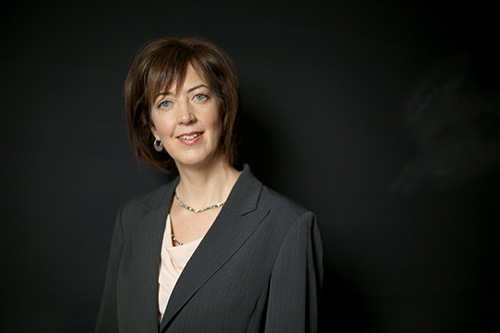
Unrest in Ukraine and Russia has dominated the news for more than a year. Cynthia Hooper, associate professor of history at Holy Cross, looks beyond the headlines and sound bites to find out why. Her passion for digging deeper into what shapes events today can be traced back decades ago when she witnessed first-hand the fall of the Berlin Wall.
A scholar in Russian and Soviet history, comparative dictatorship, and culture and politics in 20th century Europe, Hooper says, “When I study history, I’m interested in questions about power and human nature, how systems of power can shape individual senses of right or wrong. For example, during the Stalin era, how did people who were involved in running the country think about their own actions? How did they evaluate ‘corruption’? And did their understandings change over time?”
Hooper is an affiliate of Harvard University’s Davis Center for Russian and Eurasian Studies. She is a regular blogger for the History News Network and a frequent commentator on CNN, where she has provided expert opinion on the crisis in Ukraine and the country’s complex relationship with Russia. Through her CNN International live television appearances, she has been seen by viewers from Europe to the Middle East, Africa, and Southeast Asia.
Time in Russia and Kazakhstan
While on sabbatical last year, Hooper spent two months in Russia and Kazakhstan, gathering information to create courses on Soviet-related topics and conduct research on social and cultural transitions from the Soviet to the post-Soviet era.
Fluent in Russian and German, Hooper had discussions with Kazak students about their world views, values, and how they distinguished contemporary dictatorship from democracy. She found students were frank about their desire to work within an authoritarian system rather than to rebel against it. “Students were extremely blunt in acknowledging their willingness to accept certain political constraints in return for financial opportunities,” she says. “Many admired the U.S., but they also saw the U.S. as a place where most citizens believe they have far more freedom than they actually do.”
Witnessing the fall of the Berlin Wall
After receiving her Ph.D. in history from Princeton, she went to Hamburg, Germany on a Fulbright grant. The year was 1989, and one morning the Berlin Wall, which had divided the country for 28 years, came down.
“We were all very perplexed about what was going on,” recalls Hooper. “People are often very unaware of paradigm-shifting events as they occur. My boyfriend and I decided to hitchhike to Berlin. Everything was changing so quickly, no one knew the rules. It was a very emotional scene at the West German border. Cars were stopped, lining the highway, families were crying and embracing as some members decided to stay and others to return.”
It was an experience that led her to want a deeper understanding of Russian history.
At Holy Cross, she is currently teaching a seminar on Cold War culture, and classes on World War II in Europe and the Soviet Union. She is completing a book titled “Terror From Within: Policing the Soviet Powerful, Under Stalin and Beyond.”
Working with students
As part of the College’s Summer Research Program in the Humanities, Social Sciences and Fine Arts, will be working with Bart LaFaso ’16, a Russian and history major in the College Honors Program from Buffalo, N.Y. They will examine the political symbolism of Vladimir Putin and examining how his image is managed in the state-controlled media.
“Our project aims to determine how Putin utilizes state media to his advantage, how the state media affects the daily lives of Russians, and how Putin’s use of media is similar to or different from the use of media by leaders such as Joseph Stalin or Benito Mussolini,” says LaFaso. “The College is lucky to have someone with Professor Hooper’s background, especially as Russia and Eastern Europe become such critical areas of study due to the events of the past few years.”
Hooper’s work will be featured again on a global scale this summer when she travels to Japan to participate in the International Council for Central and East European Studies (ICCEES) World Congress.
Her current research focus is on how the U.S. and the Soviet Union continue their “uneasy competition.” She explains: “In many ways, contemporary Russia is still struggling to define itself against a part-real, part-imaginary West — a realm that many members of the Russian elite seem to want simultaneously both to emulate and to undermine.”
Related Information
- The Conversation, March 30: Russia fighting information wars with borrowed weapons

